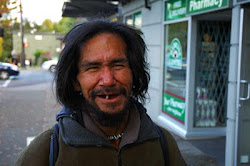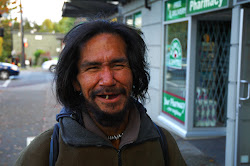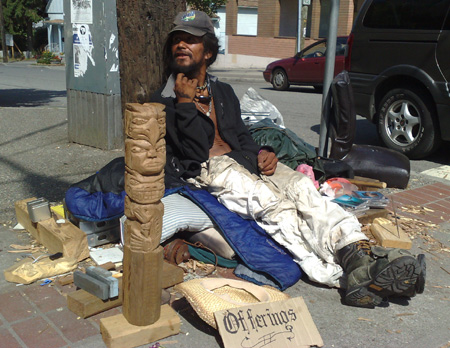‘Poverty is more than a collection of data’
In Spring 2012, Danse Crowkiller, a homeless resident of Vancouver’s Downtown Eastside, returned to UBC to share his experiences with homelessness, his philosophies on materialism, and his passion for carving.
Last year, economics instructor Catherine Douglas invited Danse and education consultant Jennifer Hales to speak with her class, ECON 317: Poverty and Inequality. She also invited students from Carla Paterson’s class on technology and development. Jennifer is the author of a resource guide to Learning about Homelessness in British Columbia.
This early Mix inspired Catherine to invite Danse and Jennifer for a repeat performance. This time, she collaborated with sociologist Carrie Yodanis and her course, SOCI 342: Consumers and Consumption.
In 2008 Danse participated in a CBC documentary (Devil Plays Hardball) that followed the journey of four homeless individuals and four housed mentors as they attempted to work together toward housing and other forms of stability. Interested in learning more from Danse’s perspective, filmmakers at Romantic Child Studios equipped Danse with a video camera to film his own experiences and thoughts. Jennifer screened an excerpt of the documentary, ‘The Purpose of Life Is Rice… Wink’ to introduce the students to Danse and gave a presentation on the causes and possible solutions for homelessness in British Columbia.
The rest of class time was set aside for a question and answer session with Danse. Danse said that ‘the meaning of life is learning’, passed around examples of his carving, and expressed his passion for the artform:
Question: ‘What gets you up in the morning?’
Answer: ‘Carving.’
Question: ‘What do you own, Danse?’
Answer: ‘My body… and my carving knife I suppose.’
While even Danse’s X-Acto knife is occasionally lost or broken, Danse’s positive attitude are steadfast. One student remarked that he was impressed with “how an individual who is not well endowed monetarily can be so rich spiritually.”
Danse and Jennifer’s presentation managed to convey both the resilience of individuals like Danse as well as the systemic challenges he faces along with thousands of others experiencing homelessness today. Exploring the nuances of economics, inequality, and consumption, students from both classes had the opportunity to reconsider their coursework in light of Danse’s personal experience.
“The discussion gave us a real feel of what happens to people living with less than enough,” one student remarked. “It showed that poverty is more than a collection of data.”
- This Mix got students thinking critically and locally about their course subject matter. UBC Mix collected brief feedback forms and students indicated that they highly value interdisciplinary learning. They want more opportunities to interact with each other and share their intellectual perspectives, experiences, and reflections. Mix will continue to find ways to build connection and foster interdisciplinary dialogue through inter-faculty and inter-community collaborations.



